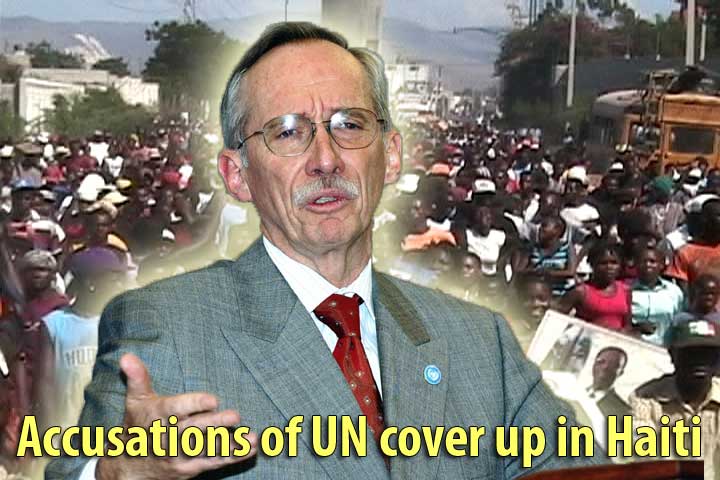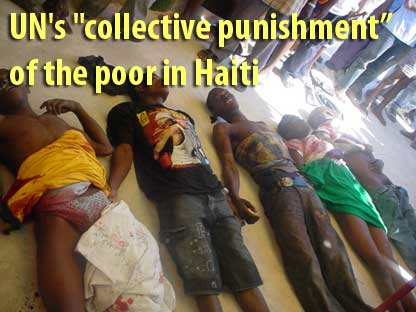|
Accusations of UN cover-up in Haiti
February 2, 2007
|
News
HaitiAction.net
|
||||
 |
 |
 |
 |
 |
 |
 Accusations of UN cover-up in Haiti
Accusations of UN cover-up in Haiti
by Haiti Information Project
HIP - UN Special Envoy to Haiti, Edmond Mulet, held a roundtable discussion at the Center for International and Strategic Studies (CSIS) in Washington this past Wednesday. The CSIS event capped off what amounted to a whirlwind week long propaganda tour by Mulet where he has sought to mitigate reports of UN forces killing unarmed civilians in recent raids against gangs in the Port-au-Prince shanty town of Cite Soleil. In response to questions about the huge amount of firepower used by UN forces in recent raids and the growing number of accounts of unarmed civilians felled by UN bullets, Mulet made an extraordinary claim. He stated, "[This past Jan. 24]...we were under attack for over an hour and they [gangs in Cite Soleil] shot more than 20,000 rounds at us - 20,000 rounds at us."
A former UN employee and law enforcement expert assigned to Haiti and speaking on condition of anonymity commented, "That's just ridiculous. We never received reports of gangs in Cite Soleil having that kind of firepower. You also have to ask how Mulet got that number of 20,000 rounds shot at UN forces? Did they stop to pick up the cartridges and count them afterwards? I don't think so."
Mulet's assertion comes on the heels of the release of Freedom of Information Act documents that show the United Nations acknowledged firing more than 22,000 rounds of ammunition during a seven-hour period in a highly controversial raid of Cite Soleil on July 6, 2005. The UN claimed they had only killed six "bandits" while human rights organizations and community activists claimed as many as 70 may have been killed, the vast majority unarmed civilians. In the same document, a personal commentary apparently added by former US Ambassador James B. Foley states, "It remains unclear how aggressive MINUSTAH was, though 22,000 rounds is a large amount of ammunition to have killed only six people." To this day, not a single international human rights organization has undertaken a serious investigation into the allegations.
The former UN employee added, "I read the reports where the UN admitted firing more than 22,000 rounds in a seven hour period on July, 6, 2005. It appears that Mulet is playing a numbers game to diminish the impact of that report. If there are gangs of 30 armed men running around with 20,000 rounds of ammunition than you're no longer talking about just gangs. You're talking about an armed insurgency and Mulet can't have it both ways. It's even more ridiculous if you do the math. It would have required each gunman to fire more than 650 sustained rounds each during the one-hour period to account for the nearly six bullets fired per second, as he would have the public believe. That's a battle of epic proportions, which I think we would have seen reported in the press by now. I just don't see it."
During Mulet's presentation at CSIS in Washington, he also managed to alienate the few Haitians who attended the event. He claimed that, "... there are many sectors who don't like our presence there. That is certain and they dislike us enormously. Of course, I have [identified] them as the ones who are involved in drug trafficking, the ones who benefit from impunity, from the disorder, from the lack of state, from lack of institutions, the people who benefit from contraband, from lack of institutions." In an interview on the radio program Variety and Vibrations heard on 1320 AM WLQY in Miami FL, a Mr. Wilbert Clerizier responded, "I was there and I took that to mean the Lavalas movement. That what he was saying was that the only people who oppose the UN occupation are Lavalas and that they are all drug dealers and criminals. I responded to Mr. Mulet that they should leave Haiti because they helped to legitimize the overthrow of the constitutional government. That would make me a drug dealer and a criminal too, which I am neither." Lavalas is the political movement of Haiti's desperately poor majority and the political party of president Jean-Bertrand Aristide who was ousted on February 29, 2004 in a coup reportedly backed by the United States, France and Canada.
Perhaps even more controversial was Mulet's attempt to write the epitaph for the Lavalas movement when he stated, "And to the Jean-Bertrand Aristide issue, when I first arrived in Haiti on the 2nd of June last year, we've had different marches and manifestations — all sorts of protests demanding for the return of this ex-president and former president. In the beginning, these were expressions of 5,000 people. Then later on they became 3,000 and the last ones maybe 75...50 people. So I see that this issue of former President Aristide is not present anymore in the political sphere in Haiti anymore, and his movement - familia Lavalas - is very much divided, weakened." Contradicting Mulet is HIP video and photographs documenting a demonstration of over ten thousand people launched from Cite Soleil this last December 16. Protestors were demanding Aristide's return, an end the UN military occupation of Haiti and the release of Lavalas political prisoners. All of this took place a mere seven weeks ago and according to Pierre-Antoine Lovinsky, one of the Lavalas organizers, "December 16, 2006 is not that long ago but long enough to go beyond the collective memory of the UN and the apparent temporary amnesia of Mr. Mulet."
Human rights activists have begun to point to the December 16th demonstration and others like it in Cite Soleil as the real reason behind the UN's expanded military operations in this poor neighborhood packed with cardboard and cinderblock shacks covered with tin roofs. Six days later on December 22, UN forces launched another major military assault on Cite Soleil that residents claim killed close to 30 people and wounded many others including a woman who was six months pregnant. She claims to have been shot by a UN armored vehicle in the abdomen instantly killing her unborn child.
Responding to well-documented reports of the UN firing from helicopters during the Dec. 22 raid, Mulet claimed, "We never shot from a helicopter — never. We had one helicopter with a camera taking pictures and following the operation, but we never shoot from helicopters. We never use heavy artillery either." According to John Carroll, an Illinois-based doctor who runs a charity that provides medical aid to Haitian children, "I spoke with the family with holes in their roof. They said the helicopter fired down on Cite Soleil for three hours. I saw the holes in the roof and the holes in the people," he said. "I went to St. Catherine's Hospital in Cite Soleil. I did not interview any doctors. I examined the patients myself and their stories seemed to correspond with their injuries," Dr. Carroll stated in a recent interview with Andrew Buncombe of The Independent based in the United Kingdom. HIP also has video documentation of a 28 year-old man whose family has asked to withhold his name due to fears of UN reprisals. He is seen dying in his home. Before succumbing to his wounds, he gives testimony that directly contradicts UN denials of firing from helicopter gun ships on the population below. "I was shot by the helicopter" were his last words.
"This is beginning to resemble collective punishment against the residents of Cite Soleil. There is more to this than just the issue of gangs and alleged kidnappers. If this were just about gangs then why isn't the UN going after the Little Machete Army in Martissant?" asked Brian Concannon, the Director of the Institute for Justice and Democracy in Haiti. A gang known as the Little Machete Army massacred spectators at a soccer game in broad daylight down the street from a UN observation post in August 2005, hacking its victims to death with machetes. The group attacked another neighborhood last summer, and according to media reports it assassinated community leader Esterne Bruner last September 21, and freelance photojournalist Jean-Remy Badio on January 19. All along, Martissant residents had been asking the UN to provide protection. The Little Machete Army still controls the area through terror and intimidation despite the presence of United Nations forces.
To further illustrate his point Concannon points to other gangs currently operating in Haiti, "Gangs that were members of the Gonaives Resistance Front took over the police station in Haiti's fourth largest city, Gonaives, in February 2004. They have never disarmed, and some of the gangs, especially those led by Wilfort Ferdinand and Winter Etienne, regularly and openly control large parts of the city to this day. But there are no large-scale assaults to dislodge them. It is hard not to see the connection between the large-scale protests in Cite Soleil, and that neighborhood's being singled out for major military operations."
In another press conference held earlier in the week at the UN headquarters in New York, Mulet admitted that while they were obsessed with disarming gangs in Cite Soleil, they allowed the former brutal military to keep their weapons and that they are still heavily armed to this day. Mulet stated, "When MINUSTAH [the UN mission] first arrived in the country, the members of former armed forces of Haiti had been a destabilizing presence, as well. ALTHOUGH STILL ARMED, they were not active and organized now."
Human rights organizations have accused the former military along with paramilitary death squads of having sowed a campaign of terror against Aristide supporters following his ouster in Feb. 2004. As part of UN policy, they were integrated into the Haitian police that was also accused of committing gross human rights violations against Aristide supporters including summary executions and arbitrary arrests. After having illegally seized the residence of the exiled former president in late 2004, the brutal former military was rewarded with a payoff of more that 29 million dollars, or $5000 per former soldier, paid for with funds provided by the international community.
Finally, new reports of a UN military operation in Cite Soleil at 1:00 AM EST today continue to come into HIP. According to reporters on the ground, a family of five was sleeping in their home when UN/MINUSTAH soldiers started firing weapons in the neighborhood; there was no report of other gunfire in the area. The mother and father were wounded and their two daughters were killed. Seven year-old Stephanie Lubin and four year-old Alexandra Lubin are now counted among the mounting toll of unarmed civilians killed by United Nations forces in Cite Soleil.
©2007 Haiti Information Project
| See Also:
UN terror kills Haiti's children at night
Feb 2
Accusations of UN cover up in Haiti Feb 2 UN's "collective punishment" of the poor in Haiti Jan 30 Flashpoints Radio US Embassy in Haiti acknowledges excessive force by UN Jan23 A Call to Action: Join the International Day in Solidarity with the People of Haiti! Coordinated International Protests on February 7, 2007 |


